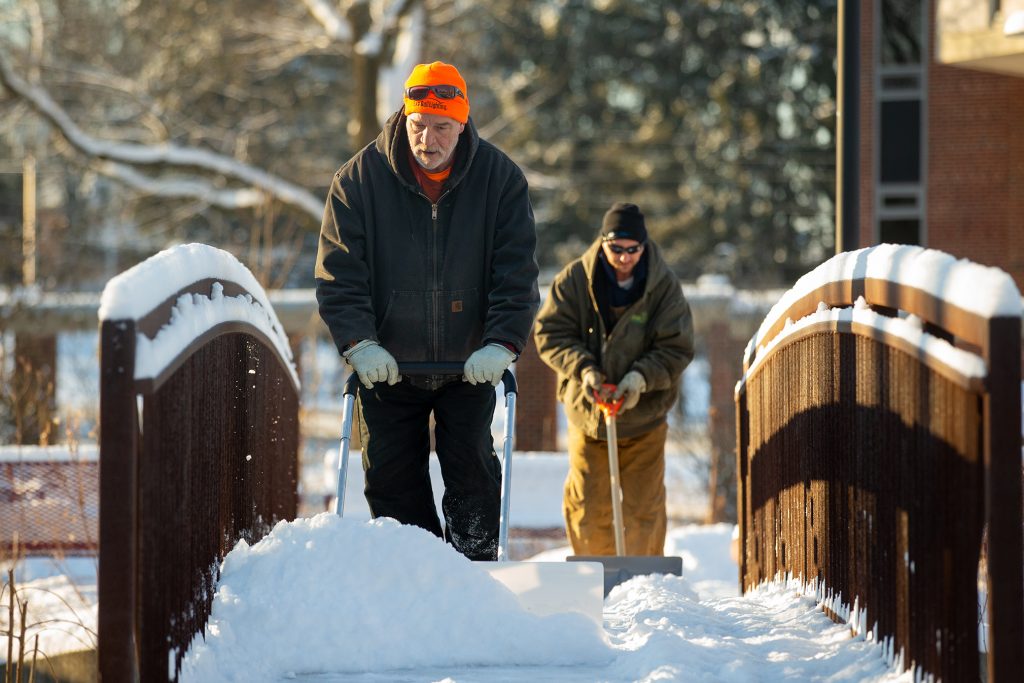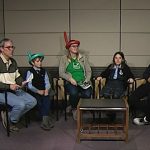KUTZTOWN, PA – KU’s University Relations (UR) office has implemented a new staff and department recognition feature. KUDOS, Kutztown University’s Dedication to Outstanding Service, focuses on university administrative departments and the individuals within it, giving the campus community a better look inside many of the working areas on campus.
This week, we sat down with the Facilities Grounds Department to get an inside look at the dedicated individuals who take care of the KU campus and have been at the forefront of the snow removal efforts.
UR: Can you introduce yourselves and tell us how long you’ve been with KU?
W: I’m Will Meeker, director of Campus Services, and I’ve been with Kutztown for 11 years.
D: I’m Dustin Jutzi, a vector control specialist from Grounds, and I’ve been here 7 years.
T: My name is Tony Morales, I’m a vector control specialist from Grounds Labor, and I’ve been working here for 15 years.
UR: What is your department’s role and mission at the university?
D: My role is to support the university mission and my department. We take care of the many acres of campus and throughout the year we have different challenges; this time of year it’s mainly snow, but in the growing season we take care of different diseases and pest problems that arise on campus trees and shrubs – a whole range of tasks.
W: Our broader role is to make sure that the students and the campus population have a safe place to take classes and work. We also try to make sure it’s an aesthetically pleasing – an attractive place where people want to come to further their academic career and work. We also take care of events like bake sales, commencement tables and chairs, etc. We make sure organizations get what they need in regards to their events.
T: We make everything look good from behind the scenes. We’re there, we fix it up, and we’re gone. We take care of just about everything you see outside. We pick up trash, and when we cut grass, we have to make sure it’s the right length for a lawn or sports field. We also take care of weed control, turf repair, flower planting, tree and shrub trimming, etc. It sounds like we do simple stuff, but there’s a little more to it than that.
UR: Well, we’re about to change that! Can you explain your department’s staff make-up and responsibilities?
T: There’s around 15 people on our crew right now. The 15 of us take care of more than 200 acres. Everyone on the staff is versatile – I’d say we’re a pretty well-melded crew.
W: We have four state classifications in the shop: groundskeeper, vector control, semi-skilled and operator. Each classification comes with its own area of specialty, but the reality is that most of the people in the shop are generalists – there’s things they do very well, but they’re all capable of doing the other things, even if it’s not something in their comfort zone or something they’re experienced in.
UR: How does your department serve students and the campus community?
T: By going out and doing the everyday tasks. It may not look like we spent hours working on trimming a tree, but we did. Most of us start around 7 a.m., while everyone else is still sleeping, and sweep the whole campus.
W: We serve as support for the academic side of the community. We make sure buildings are heated in the winter and cool in the summer, that there isn’t trash, litter, or branches laying around. In areas that are attractive and peaceful, students are much more inclined to be at ease, so we make sure that happens here.
UR: What are the points of pride in your department?
T: When I hear people walk around and say, ‘this place is really nice-looking.’ I have pride in the landscaping and what we do because other people like it. I’ve been to other universities, and I personally think they can’t hold a candle to KU. To be able to say that we work on a university campus that looks this good is self-gratifying. Every place you look, even in the middle of winter, it’s aesthetically pleasing. Everyone on our crew takes pride in getting it done without a pat on the back.
D: Part of it is that things run smoothly. If we’re doing our jobs well, we don’t really stand out. Providing a good environment behind the scenes is my point of pride.
W: All the people in the shop are selfless. They come in at 3 a.m. and don’t complain. The rest of the university is off, and they’re here working. Not only that, but at the end of the day they have to go home and take care of their own houses because they’ve been here all day! It speaks volumes to the people we have here, and they get satisfaction out of doing the right thing for the campus by really making it a wonderful place for people to come to.
UR: What would you like people to know about your department that they may not know already?
T: That we’re more specialized than what people may think. It’s a lot more than just hopping on a mower and picking up trash. We’re actually schooled, and some people are even certified through the Department of Agriculture. When you go spraying weeds, it’s not just spray you can pick up at Home Depot – you have to know what kind of weed, what kind of insect, etc. There’s a lot of time and effort that we put into preparation. We’re like firemen – if there’s a fire, we run to put it out; if there’s not, we’re preparing for it. There’s a lot of background work that people don’t know goes into snow removal and grass cutting.
D: Our work isn’t something that’s often esteemed in the public eye, but at the end of the day it’s necessary. Somebody has to pick up the fallen branches, and we’re those people.
W: On an annual basis, our facilities is scored and the compared to the other State System facilities departments. For the last 10 years, KU grounds has received some of the highest scores. We don’t have as many staff as our sister schools, but we score as high as and higher than them. As great as our campus looks, you’d expect that we’d have a larger staff to take care of it – it’s a testament to the skills of the people we have here.
UR: How can the campus community learn more or become involved with your department?
D: We do hire student workers. If students want to support the department out of goodwill, if there’s something hazardous on the walkway, feel free to set it aside. Given the snowy weather right now, there’s no way for us to have pavements and roads completely bare and dry, so I’d ask that students just be mindful, use care, and know that we’re doing the best we can.
W: When people see our folks out there working, they should feel free to engage them in conversation with questions they might have. We’re isolated from the rest of the campus, so there’s not a lot of interaction with our folks; our staff would be glad to have a conversation with students and give them ideas about what they can do at their own homes.
UR: What’s your favorite thing about your KU experience?
T: Being part of this crew. We’ve got a good bunch of people. It’s an honor for me to walk on this campus because I’m not an educated person by paper – for me to be a vector control specialist and do what I do on the university grounds is cool for me. I like having the honor of sharing information about what I do with people who care to learn.
D: I appreciate higher education and I like being in a supporting role to that. I enjoy nature and working with plants and trees, so this is an opportunity to do so while supporting the campus.
W: I love working with the different people throughout the campus. I like that we help educate students, even though we do it a little differently than the faculty by providing the spaces for them to learn. I take pride in working with faculty members and knowing that we put in a wildflower meadow or something that helped a student along the way.
UR: What does “It’s Good to be Golden” mean to you?
T: It’s good to be a part of KU. I even wear KU apparel when I take my wife to a restaurant. People will ask, “Do you work there?” and I tell them with pride, “Yes, I do.” It’s a neat feeling when they respond, “Oh, what a beautiful campus.” I just kind of pat myself on the back knowing that I contributed to that.
D: I think it’s a play on several different meanings. “Golden” is getting at the school mascot, but beyond that it historically indicates a certain excellence, a gold standard. So, it speaks of the KU identity and the excellence that students, faculty, and staff always strive for.
W: It means being a small part of a much bigger family or community.




